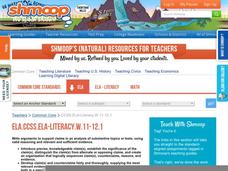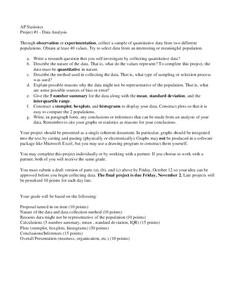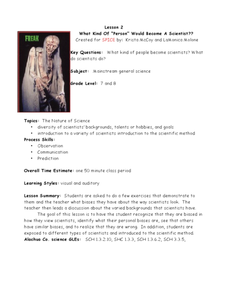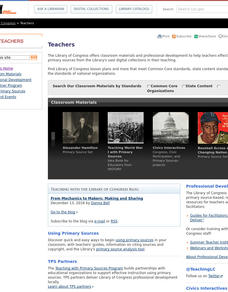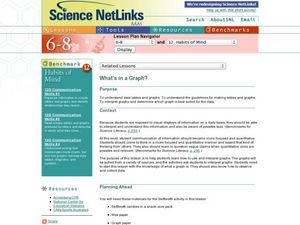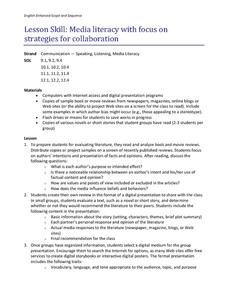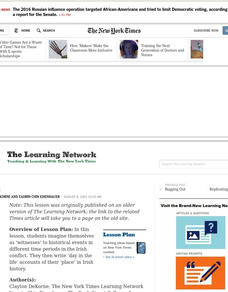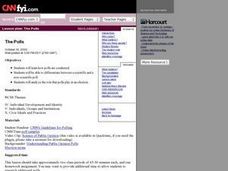National Endowment for the Humanities
Faulkner's As I Lay Dying: Burying Addie's Voice
Students explore the use of voice and title in William Faulkner's, "As I Lay Dying". They identify and discuss the use of image, symbols and narrative voice in the story.
National Endowment for the Humanities
Faulkner's As I Lay Dying: Concluding the Novel
As I Lay Dying is a beautiful book and a wonderful vehicle for understanding, interpreting, and comparing themes. The class reads and analyzes the novel, discusses possible interpretations, and characterizations. They compare the themes...
Curated OER
Environmental Exchange Box
Students examine the characteristics of their own environment and compare them to another region. They prepare a box filled with items and stories about their own region, exchange the box with another class in another region, and...
Curated OER
Eloquent Words
Logan’s Lament, a speech delivered by Mingo Chief Logan in 1774, provides pupils with an opportunity to not only study the historical events surrounding the battle between Native Americans and the Europeans for the West Virginia...
Curated OER
Not Getting the News about the Stamp Act
How did American colonists react to the Stamp Act of 1765? Your young historians will examine primary source material by reading excerpts from a transcription of the Pennsylvania Gazette and then identifying the sentiments expressed...
Shmoop
ELA.CCSS.ELA-Literacy.W.11-12.1
Focus on writing argument essays with your high schoolers. The lesson suggested here focuses on The Jungle, by Sinclair Lewis; however, the idea could be adapted for other texts. Check out the quick quiz provided at the end of the...
Federal Reserve Bank
Time Inconsistency: Today’s Actions = Tomorrow’s Regrets
Why do we choose instant gratification over maximizing lifetime satisfaction? How is this reflected in government and macroeconomics? Learn how one research analyst proposes individuals and governments can accomplish greater lifetime...
Calisphere
The 6 C's of Primary Source Analysis
Arm your class members with the six C's of primary source analysis—content, citation, context, connections, communication, and conclusions—and help them to establish a solid system for analyzing historical sources of...
Fort Bend Independent School District
Data Analysis - AP Statistics
What better way to study survey design than to design your own survey! Bring a versatile data analysis project to your AP Statistics class, and encourage them to apply the practices from their instructions to a real-world survey...
College Board
Evaluating Sources: How Credible Are They?
How can learners evaluate research sources for authority, accuracy, and credibility? By completing readings, discussions, and graphic organizers, scholars learn how to properly evaluate sources to find credible information. Additionally,...
Curated OER
What Kind of "Person" Would Become a Scientist?
"Scientist Stereotypes" could be another name for this lesson! Begin by drawing from middle schoolers' preconceived notions and media portrayal of scientists, and then explain that anyone can be a scientist. Even though there is an...
Curated OER
What Can Data Tell Us?
Learners analyze data they have collected themselves and by their classmates. In groups, they create data distributions to identify the highest, lowest and middle values. As a class, they discuss the concept of sample size and how it can...
Curated OER
The New Deal: North Carolina's Reconstruction
Eighth graders study North Carolina's reconstruction through an interdisciplinary project that emcompasses social studies, language arts, visual art, music, and technology.
Curated OER
Maps and the Pictures in Our Heads
Geographers of all ages examine different types of maps. They draw maps of their environment, utilizing both three-dimensional and picture maps. They interpret map information, noting how it can sometimes be misleading. Some good...
Curated OER
What's in a Graph?
Students explore how to use and interpret graphs. The graphs are pulled from a variety of sources, and the activities ask students to interpret graphs. They start this lesson with knowledge of what a graph is. Students also know how to...
Curated OER
What is History? Timelines and Oral Histories
Students determine that their lifetime shows just a small piece of history. They determine how two or more accounts of the same event can be different. They write an account of the same event from two perspectives.
English Enhanced Scope and Sequence
Media Literacy with Focus of Strategies for Collaboration
Introduce your class to literary analysis with a series of activities that has them examine book and movie reviews. Groups then draft their own review of a text, select a digital medium, and craft a presentation.
Curated OER
Ire Land
Students imagine themselves as 'witnesses' to historical events in different time periods in the Irish conflict. They write 'day in the life' accounts of their 'place' in Irish history.
Curated OER
From Basketball Court to Supreme Court
Learners discuss scenarios about unfairness and retaliation in school sports. They read about a recent Supreme Court ruling about Title IX, and research, conduct polls and write articles about public opinions on gender issues in sports.
Curated OER
How Are We Different?
Students discuss the differences between boys and girls. In this acceptance lesson, students view pictures of boys and girls and use a Venn Diagram to chart their differences. Students discuss boy activities and girl...
Curated OER
Critiquing A Speech Contestant
What makes a speech effective? Middle schoolers critique a speech for content and presentation. They view a video of a middle school student presenting an informational speech, They outline the content of the speech and critique the...
Curated OER
Scientific Method
Students examine the steps of the scientific method. They define related vocabulary terms, view a PowerPoint presentation, and apply and identify the steps of the scientific method for an online experiment scenario.
Curated OER
The Great Depression in North Carolina: Experiences of the People
Learners explore the Great Depression. In this research skills lesson, students interpret historical evidence presented in primary and secondary sources. Learners write their own WPA interviews after they have examined...
Curated OER
The Polls
Students obtain how polls are conducted. They differentiate between scientific and non-scientific poll. They analyze the role that polls play in an election.







